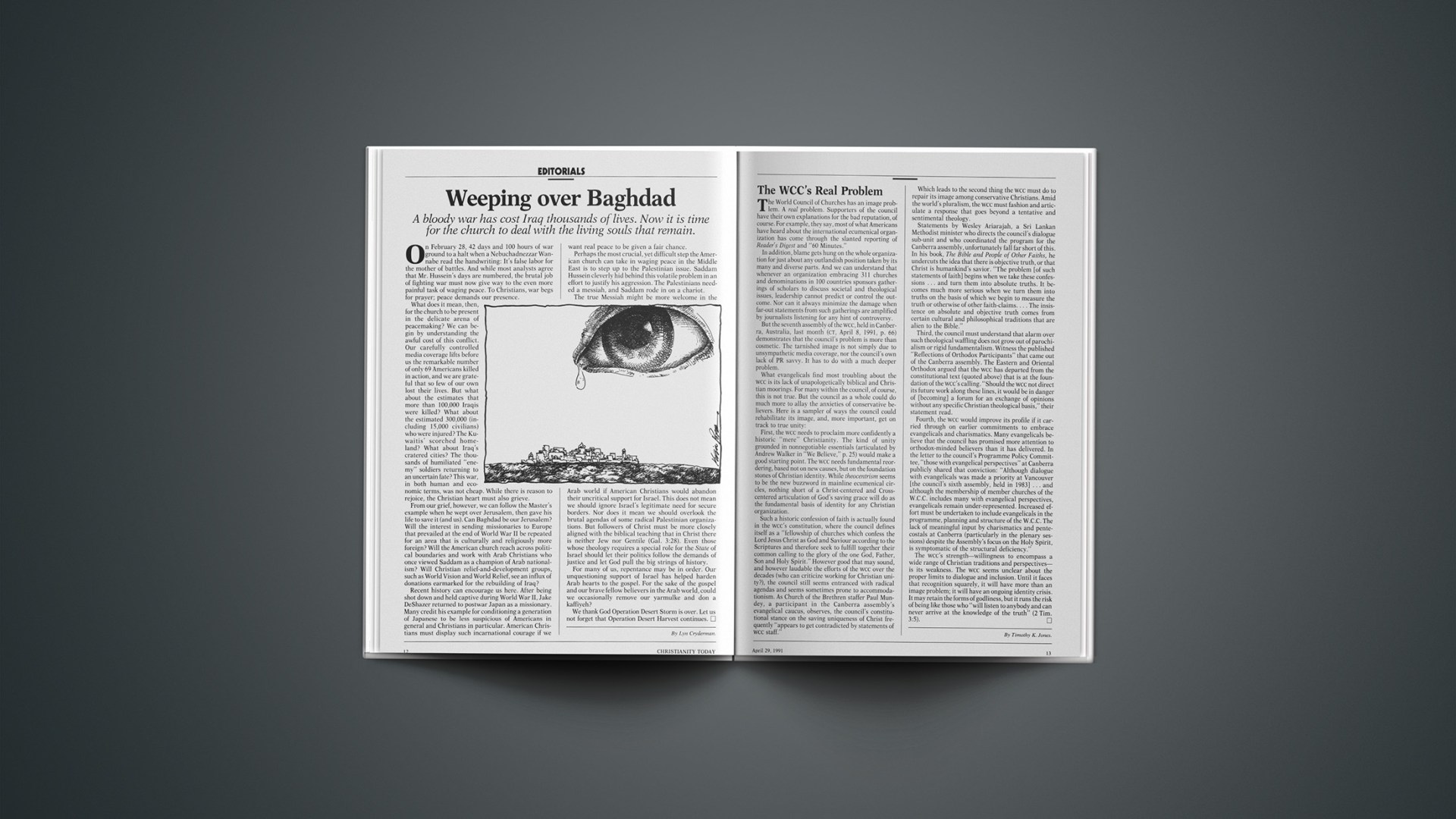The World Council of Churches has an image problem. A real problem. Supporters of the council have their own explanations for the bad reputation, of course. For example, they say, most of what Americans have heard about the international ecumenical organization has come through the slanted reporting of Reader’s Digest and “60 Minutes.”
In addition, blame gets hung on the whole organization for just about any outlandish position taken by its many and diverse parts. And we can understand that whenever an organization embracing 311 churches and denominations in 100 countries sponsors gatherings of scholars to discuss societal and theological issues, leadership cannot predict or control the outcome. Nor can it always minimize the damage when far-out statements from such gatherings are amplified by journalists listening for any hint of controversy.
But the seventh assembly of the WCC, held in Canberra, Australia, last month (CT, April 8, 1991, p. 66) demonstrates that the council’s problem is more than cosmetic. The tarnished image is not simply due to unsympathetic media coverage, nor the council’s own lack of PR savvy. It has to do with a much deeper problem.
What evangelicals find most troubling about the WCC is its lack of unapologetically biblical and Christian moorings. For many within the council, of course, this is not true. But the council as a whole could do much more to allay the anxieties of conservative believers. Here is a sampler of ways the council could rehabilitate its image, and, more important, get on track to true unity:
First, the WCC needs to proclaim more confidently a historic “mere” Christianity. The kind of unity grounded in nonnegotiable essentials (articulated by Andrew Walker in “We Believe,” p. 25) would make a good starting point. The WCC needs fundamental reordering, based not on new causes, but on the foundation stones of Christian identity. While theocentrism seems to be the new buzzword in mainline ecumenical circles, nothing short of a Christ-centered and Cross-centered articulation of God’s saving grace will do as the fundamental basis of identity for any Christian organization.
Such a historic confession of faith is actually found in the WCC’s constitution, where the council defines itself as a “fellowship of churches which confess the Lord Jesus Christ as God and Saviour according to the Scriptures and therefore seek to fulfill together their common calling to the glory of the one God, Father, Son and Holy Spirit.” However good that may sound, and however laudable the efforts of the WCC over the decades (who can criticize working for Christian unity?), the council still seems entranced with radical agendas and seems sometimes prone to accommodationism. As Church of the Brethren staffer Paul Mundey, a participant in the Canberra assembly’s evangelical caucus, observes, the council’s constitutional stance on the saving uniqueness of Christ frequently “appears to get contradicted by statements of WCC staff.”
Which leads to the second thing the WCC must do to repair its image among conservative Christians. Amid the world’s pluralism, the WCC must fashion and articulate a response that goes beyond a tentative and sentimental theology.
Statements by Wesley Ariarajah, a Sri Lankan Methodist minister who directs the council’s dialogue sub-unit and who coordinated the program for the Canberra assembly, unfortunately fall far short of this. In his book, The Bible and People of Other Faiths, he undercuts the idea that there is objective truth, or that Christ is humankind’s savior. “The problem [of such statements of faith] begins when we take these confessions … and turn them into absolute truths. It becomes much more serious when we turn them into truths on the basis of which we begin to measure the truth or otherwise of other faith-claims.… The insistence on absolute and objective truth comes from certain cultural and philosophical traditions that are alien to the Bible.”
Third, the council must understand that alarm over such theological waffling does not grow out of parochialism or rigid fundamentalism. Witness the published “Reflections of Orthodox Participants” that came out of the Canberra assembly. The Eastern and Oriental Orthodox argued that the WCC has departed from the constitutional text (quoted above) that is at the foundation of the WCC’s calling. “Should the WCC not direct its future work along these lines, it would be in danger of [becoming] a forum for an exchange of opinions without any specific Christian theological basis,” their statement read.
Fourth, the WCC would improve its profile if it carried through on earlier commitments to embrace evangelicals and charismatics. Many evangelicals believe that the council has promised more attention to orthodox-minded believers than it has delivered. In the letter to the council’s Programme Policy Committee, “those with evangelical perspectives” at Canberra publicly shared that conviction: “Although dialogue with evangelicals was made a priority at Vancouver [the council’s sixth assembly, held in 1983] … and although the membership of member churches of the W.C.C. includes many with evangelical perspectives, evangelicals remain under-represented. Increased effort must be undertaken to include evangelicals in the programme, planning and structure of the W.C.C. The lack of meaningful input by charismatics and pentecostals at Canberra (particularly in the plenary sessions) despite the Assembly’s focus on the Holy Spirit, is symptomatic of the structural deficiency.”
The WCC’s strength—willingness to encompass a wide range of Christian traditions and perspectives—is its weakness. The WCC seems unclear about the proper limits to dialogue and inclusion. Until it faces that recognition squarely, it will have more than an image problem; it will have an ongoing identity crisis. It may retain the forms of godliness, but it runs the risk of being like those who “will listen to anybody and can never arrive at the knowledge of the truth” (2 Tim. 3:5).










